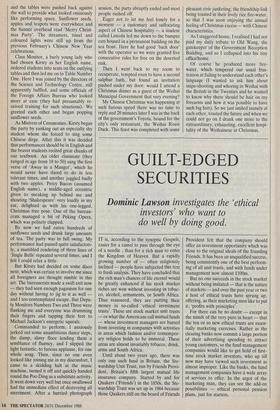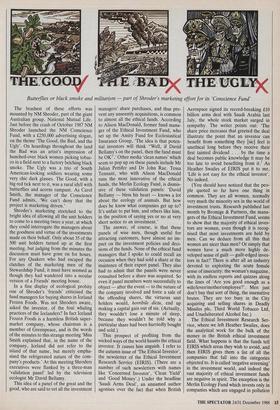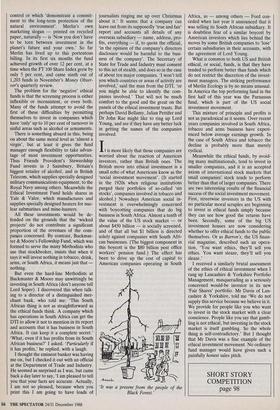GUILT-ED GED SECURITIES
IT is, according to the synoptic Gospels, easier for a camel to pass through the eye of a needle , than for a rich man to enter the Kingdom of Heaven. But a rapidly growing number of — often religiously inclined — people have subjected this text to fresh analysis. They have concluded that the rich man's chances of life eternal would be greatly enhanced if his stock market riches are won without investing in tobac- co, alcohol, armaments, or South Africa. Thus reassured, they are putting their money in so-called 'ethical investment trusts'. These are stock market unit trusts — or what the Americans call mutual funds — whose investment managers are barred from investing in companies with activities in areas which fashion and/or contempor- ary religion holds to be immoral. These areas are almost invariably tobacco, drink, arms and South Africa.
Until about two years ago, there was only one such fund in Britain, the Ste- wardship Unit Trust, run by Friends Provi- dent, Britain's fifth largest mutual life insurance company. Started by and for Quakers ('Friends') in the 1850s, the Ste- wardship Trust was set up in 1984 because those Quakers still on the board of Friends Provident felt that the company should offer an investment opportunity which was close to the original ideals of the founding Friends. It has been an unqualified success, being consistently one of the best perform- ing of all unit trusts, and with funds under management now almost £100m.
But no one succeeds in the stock market without being imitated — that is the nature of markets — and over the past year or two a host of ethical trusts have sprung up, offering, as their marketing men like to put it, 'profits with principles'.
For there can be no doubt — except in the minds of the very pure in heart — that the ten or so new ethical trusts are essen- tially marketing exercises. Rather as the clearing banks now commit a large portion of their advertising spending to attract young customers, so the fund management companies would like to get hold of first- time stock market investors, who up till now may have viewed such investment as almost improper. Like the banks, the fund management companies have a wide array of services to offer. In the argot of the marketing man, they can see the add-on possibilities — ethical personal pension plans, just for starters.
Butterflies or black smoke and militarism — part of Shroder's marketing effort for its 'Conscience Fund'
The brashest of these efforts was mounted by NM Shroder, part of the giant Australian group, National Mutual Life. Just before the crash of October 1987 NM Shroder launched the NM Conscience Fund, with a L250,000 advertising slogan, on the theme 'The Good, the Bad, and the Ugly'. On hoardings throughout the land the Bad was an artist's impression of hunched-over black women picking tobac- co in a field next to a factory belching black smoke. The Ugly was a trio of South American-looking soldiers wearing some very chic dark glasses. The Good, with a big red tick next to it, was a rural idyll with butterflies and acorns rampant. As Carol Smith, the manager of the Conscience Fund admits, 'We can't deny that the project is marketing driven.'
Shroder's marketing stretched to the bright idea of allowing all the unit holders to come to a meeting twice a year, at which they could interrogate the managers about the goodness and virtue of the investments made on their behalf. Only about 35 of the 500 unit holders turned up at the first meeting, but judging from the minutes the discussion must have gone on for hours. For any Quakers who had escaped the clutches of the marketing men of the Stewardship Fund, it must have seemed as though they had wandered into a secular version of a Friends' meeting house.
In a fine display of ecological probity one of Shroder's 'friends' criticised the fund managers for buying shares in Iceland Frozen Foods. Was not Shroders aware, asked the investor, of the foul whaling practices of the Icelanders? In fact Iceland Frozen Foods is a harmless British super- market company, whose chairman is a member of Greenpeace, and in the words of the minutes to this strange meeting 'Miss Smith explained that, in the name of the company, Iceland did not refer to the island of that name, but merely empha- sised the refrigerated nature of the com- pany's products.' At this meeting Shroders executives were flanked by a three-man 'validation panel' led by the television ecologist Mr David Bellamy.
This idea of a panel of the great and the good, who are said to vet all the investment managers' share purchases, and thus pre- vent any unseemly acquisitions, is common to almost all the ethical funds. According to Alison MacDonald, former fund mana- ger of the Ethical Investment Fund, who set up the Amity Fund for Ecclesiastical Insurance Group, 'The idea is that poten- tial investors will think "Well, if David Bellamy's on the panel, then the fund must be OK".' Other media 'clean names' which seem to pop up on these panels include Mr Julian Pettifer and Dr John Rae. Tessa Tennant, who with Alison MacDonald runs the most innovative of the ethical funds, the Merlin Ecology Fund, is dismis- sive of these validation panels: 'David Bellamy — bless his heart — knows a lot about the ecology of animals. But how does he know what companies get up to? It's unfair to put him, and others like him, in the position of saying yes or no at very short notice to an investment.'
The answer, of course, is that these panels of wise men, though useful for attracting customers, have almost no im- pact on the investment policies and deci- sions of the funds. None of the ethical fund managers that I spoke to could recall an occasion when they had sold a share at the insistence of their expert panel. They also had to admit that the panels were never consulted before a share was acquired. So even if panel members were successfully to object — after the event — to the nature of the company involved and force a sale of the offending shares, the virtuous unit holders would, horribile dictu, end up making a capital gain out of sin. (Actually, they wouldn't lose a minute of sleep, because they wouldn't be told why a particular share had been hurriedly bought and sold.) This prospect of profiting from the wicked ways of the world haunts the ethical investor. It causes him anguish. I refer to the autumn issue of 'The Ethical Investor', the newsletter of the Ethical Investment Research Service (EIRIS). (There are a number of such newsletters with names like 'Concerned Investor', 'Clean Yield' and 'Good Money'.) Under the headline 'Saudi Arms Deal', an unnamed author agonises over the fact that when British Aerospace signed its record-breaking f10 billion arms deal with Saudi Arabia last July, the whole stock market surged in sympathy. The writer points out: 'The share price increases that greeted the deal illustrate the point that an investor can benefit from something they [sic] feel is unethical long before they receive their first tainted dividend . . . by the time a deal becomes public knowledge it may be too late to avoid benefiting from it.' As Heather Swailes of EIRIS put it to me, 'Life is not easy for the ethical investor'. No indeed.
(You should have noticed that the peo- ple quoted so far have one thing in common. They are all women, normally very much the minority sex in the world of investment trusts. Research published last month by Bromige & Partners, the mana- gers of the Ethical Investment Fund, seems to show that the majority of ethical inves- tors are women, even though it is recog- nised that most investments are held by men. Can we deduce from all this that women are nicer than men? Or simply that women have a much more highly de- veloped sense of guilt — guilt-edged inves- tors in fact? There is after all an industry devoted to exploiting the acute female sense of insecurity: the woman's magazine, with its endless reports and quizzes along the lines of 'Are you good enough as a wife/lover/mother/employee?'. Men just don't buy that sort of thing, the insensitive brutes. They are too busy in the City acquiring and selling shares in Deadly Missiles plc, Third World Tobacco Ltd, and Unadulterated Alcohol Inc.) The Ethical Investment Research Ser- vice, where we left Heather Swailes, does the analytical work for the bulk of the money in the British ethical investment field. What happens is that the funds tell EIRIS which areas they wish to avoid, and then EIRIS gives them a list of all the companies that fall into the categories objected to. It is called 'negative screening' in the investment world, and indeed the vast majority of ethical investment funds are negative in spirit. The exception is the Merlin Ecology Fund which invests only in companies which are engaged in pollution control or which 'demonstrate a commit- ment to the long-term protection of the natural environment'. Merlin's own marketing slogan — printed on recycled paper, naturally — is 'Now you don't have to be torn between investment in the planet's future and your own.' So far Merlin has lived up to this portentous billing. In its first six months the fund achieved growth of over 12 per cent, at a time when the FT 100 Share Index grew by only 5 per cent, and came ninth out of 1,203 funds in November's Money Obser- ver's quarterly review.
The problem for the 'negative' ethical funds is that the screening process is either inflexible or inconsistent, or even both. Many of the funds attempt to avoid the first of these difficulties by permitting themselves to invest in companies which have 'only' up to 10 per cent of turnover in sinful areas such as alcohol or armaments.
There is something absurd in this, being on about the same moral level as 'almost a virgin', but at least it gives the fund manager enough flexibility to take advan- tage of most investment opportunities. Thus Friends Provident's Stewardship Fund invests in J Sainsbury, Britain's biggest retailer of alcohol, and in British Telecom, which supplies specially designed military communications equipment, to the Royal Navy among others. Meanwhile the Ethical Investment Fund holds shares in Yale & Valor, which manufactures and supplies specially designed heaters for nuc- lear submarines and mine-hunters.
All these investments would be de- fended on the grounds that the 'wicked projects' do not contribute a significant proportion of the revenues of the com- panies concerned. By contrast, Buckmas- ter & Moore's Fellowship Fund, which was formed to serve the many Methodists who use that stockbroker, insists that when it says it will invest nothing in tobacco, drink, arms, or South Africa, it means just that — nothing.
But even the hard-line Methodists at Buckmaster & Moore may unwittingly be investing in South Africa (don't anyone tell Lord Soper). I discovered this when talk- ing to a director of a distinguished mer- chant bank, who told me: 'This South African thing is not as straightforward as the ethical funds think. A company which has operations in South Africa can get the DTI to allow it not to mention in its report and accounts that it has business in South Africa. It can keep it a complete secret.' 'What, even if it has profits from its South African business?' I asked. 'Particularly if it has profits,' he replied, with a laugh.
I thought the eminent banker was having me on, but I checked it out with an official at the Department of Trade and Industry. He seemed as surprised as I was, but came back a day later to say, 'I am pleased to tell you that your facts are accurate. Actually, I am not so pleased, because when you print this I am going to have loads of journalists ringing me up over Christmas about it.' It seems that a company can leave out from its supposedly 'true and fair' report and accounts all details of any overseas subsidiary — name, address, pro- fits, everything — if, to quote the official, 'in the opinion of the company's directors disclosure would be harmful to the busi- ness of the company'. The Secretary of State for Trade and Industry must consent to this act of stealth, and does so in the case of about ten major companies. 'I won't tell you which countries or areas of activity are involved,' said the man from the DTI, 'or you might be able to identify the com- panies involved.' That will not be much comfort to the good and the great on the panels of the ethical investment trusts. But perhaps David Bellamy, Julian Pettifer and Dr John Rae might like to ring up Lord Young, and see if they have any better luck in getting the names of the companies involved.
It is more likely that those companies are worried about the reaction of American investors, rather than British ones. The British move into ethical investment is a small echo of what Americans know as the 'social investment movement'. (It started in the 1920s when religious institutions purged their portfolios of so-called 'sin stocks', companies involved in tobacco and alcohol.) Nowadays American social in- vestment is overwhelmingly concerned with boycotting companies that do big business in South Africa. Almost a tenth of the value of the US stock market — or about $450 billion — is socially screened, and of that all but $1 billion is directed solely against companies with South Afri- can businesses. (The biggest component in this boycott is the $80 billion post office workers' pension fund.) The effect has been to drive up the cost of capital to American companies operating in South It was a present from the people of the Black Forest.' Africa, as — among others — Ford con- ceded when last year it announced that it was selling its South African subsidiary. It is doubtless fear of a similar boycott by American investors which lies behind the moves by some British companies to 'lose' certain subsidiaries in their accounts, with the agreement of Lord Young.
What is common to both US and British ethical, or social, funds, is that they have tended to perform better than funds which do not restrict the discretion of the invest- ment managers. The striking performance of Merlin Ecology is by no means unusual. In America the top performing fund in the first half of this year was the Parnassus fund, which is part of the US social investment movement.
This mixture of principle and profits is not as paradoxical as it seems. Over recent years companies involved in South Africa, tobacco and arms business have experi- enced below average earnings growth. In the case of South Africa and tobacco the decline is probably more than merely cyclical.
Meanwhile the ethical funds, by avoid- ing many multinationals, tend to invest in smaller companies, and it is an accepted axiom of international stock markets that small companies', stock tends to perform better than that of larger companies. There are two interesting results of the financial success of the social investment movement. First, streetwise investors in the US with no particular moral scruples are beginning to invest in ethical funds simply because they can see how good the returns have been. Secondly, some of the big US investment houses are now considering whether to offer ethical funds to the public themselves. Or as Barron's, the US finan- cial magazine, described such an opera- tion, 'You want ethics, they'll sell you ethics. You want sleaze, they'll sell you sleaze.'
I received a similarly brutal assessment of the ethics of ethical investment when I rang up Lancashire & Yorkshire Portfolio Management, masquerading as a seriously concerned would-be investor in its new 'Fair Shares' portfolio. Mr Davis of Lan- cashire & Yorkshire, told me 'We do not supply this service because we believe in it. We provide for people like you who want to invest in the stock market with a clear conscience. People like you say that gamb- ling is not ethical, but investing in the stock market is itself gambling. So the whole thing is self-contradictory.' But I thought that Mr Davis was a fine example of the ethical investment movement. No ordinary fund manager would have given such a painfully honest sales pitch.












































































































 Previous page
Previous page